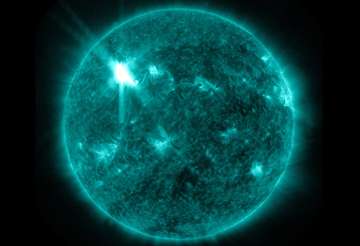Washington, Mar 8: The largest solar storm in five years is racing toward Earth, threatening to unleash a torrent of charged particles that could disrupt power grids, Global Positioning Systems (GPS) and flights.
The sun erupted on Tuesday evening and the effects should start hitting Earth early on Thursday morning (GMT) according to forecasters at the United States' Space Weather Prediction Centre.
They say the storm, which started with a massive solar flare, is growing as it speeds outward from the sun.
There is potential for widespread problems.
Solar storms have three ways they can disrupt technology on Earth: with magnetic, radio and radiation emissions.
This is an unusual situation when all three types of solar storm disruptions are likely to be strong.
Scientists say the sun has been relatively quiet for some time and this storm, while strong, may seem fiercer because Earth has been lulled by several years of weak solar activity.
NASA Sun scientist Lika Guhathakurta says there may be a disruption to satellite communication and if your phone connection is through a satellite, conversation may be interrupted.
NASA scientists combine forces with weather forecasters at the US National Oceanic and Atmospheric Administration, to come up with a space weather forecast that includes information about the solar storm.
NOAA then makes a prediction as to the strength of the storm.
So far, this storm ranks as a three out of five.
The solar storm is likely to last until Friday morning, but the region of the Sun that erupted can still send more blasts our way.
Scientists are watching another set of active sunspots potentially aimed at Earth over the next several days.
But a NASA spokesman said the space agency isn't taking any extra precautions to protect astronauts on the International Space Station from added radiation.
As for other forms of electrical connections, there probably won't be any disruption to power grids, but GPS navigation tools may be thrown off by the charged particles from the sun.
But for now, scientists are waiting to see what happens on Thursday when the charged particles hit the earth.
Latest World News
